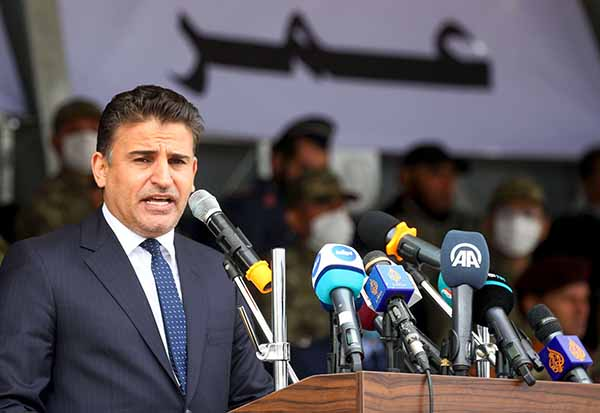
Turkey views the proposal of a Saleh-Bashagha tandem as a threat to its maritime border demarcation agreement with the GNA that has angered Paris and Athens.
The successive statements issued by the Minister of Defence in the Government of National Accord, Salah El-Din al-Namroush, indicate that, for all practical intents and purposes, he has become Ankara’s man in Libya, in light of the differences between Turkey and the Libyan Justice and Construction Party, the political arm of the Muslim Brotherhood organisation in the country.
Ever since his appointment at the helm of the GNA’s Ministry of Defence, Namroush has been singing a different tune, far removed from the path of the political settlement that most political parties in Tripoli have adopted, except for those affiliated with Ankara, which views the political track as threatening to end its influence in the country.
Turkey did not hesitate to violate the military understandings between the members of the 5 + 5 Committee by continuing to sign training agreements with the Ministry of Defence in the Government of National Accord. On Saturday, Ankara hinted at its intention to extend the mission of its forces in Libya by another 18 months, in defiance of the military path that basically stipulates the removal of all foreign forces from the country.
On Saturday, Namroush attacked France and accused it of supporting the Libyan National Army (LNA) led by Field Marshal Khalifa Haftar, saying, “It is a shame that France has supported Haftar for years, and we hope that this position will change.”
He expressed the GNA’s readiness to hold talks to reach a political solution, as long as Haftar and Aguila Saleh, Speaker of the House of Representatives in Tobruk, is permanently side-lined.
For some time now, news have been circulating in Tripoli of about differences between two contending currents. One current is trying to reach a settlement, in which Aguila Saleh will head the new presidential council, while Fathi Bashagha, the current Minister of the Interior, assumes the post of prime minister. Another another current rejects this formula and insists on the final exclusion of the LNA from the settlement.
Several countries support the first formula, including Egypt and France, the two most prominent opponents of Turkey, which views the proposal of a Saleh-Bashagha tandem as a threat to its maritime border demarcation agreement with the GNA that has angered Paris and Athens.
Observers do not rule out that Russia is also among the countries welcoming this formula after the release of its citizens imprisoned in Tripoli for over a year and a half, and this despite reports of a Turkish mediation between Moscow and Tripoli to secure this deal.
Media reports spoke of Turkish annoyance over the visits that Bashagha had made to both Egypt and France. The effect of Ankara’s displeasure reached Tripoli, where reports are circulating about the governor of the Central Bank of Libya, Seddik al-Kabir, refusing to release funds for the Ministry of the Interior intended for the acquisition of French helicopters, thus causing the outbreak of a crisis between the two parties, leading Bashagha to place a travel ban on Kabir.
These developments are putting pressure on Turkey, which is betting on its stay in Libya, either through a settlement made to its measure or through violating the ceasefire agreement and igniting a new war.
If push comes to shove and Turkey goes for the scenario of war, then Namroosh would be its arm on the ground. Ankara had already begun preparing for such a scenario by training elements from the Ministry of Defence at the expense of the Ministry of the Interior forces.
Observers agree that al-Namroush, who was appointed at the end of last August during Bashagha’s visit to Ankara, has become Turkey’s replacement for the latter as its man in Libya, in light of disagreements that appeared between Turkish officials and Bashagha during the latter’s afore-mentioned visit.
Namroush does not show any support for the 5 + 5 talks and was the first to violate their outcomes after refusing to cancel military exercises with Turkey, in addition to signing a new agreement with Doha.
Article 2 of the ceasefire agreement stipulates “freezing all military agreements related to training inside Libya and the exit of foreign training crews until the unified government takes over its duties and directs the security room that will be formed under this agreement to propose and implement special security arrangements to ensure the security of the areas evacuated from military units and armed formations.”
On Saturday, the Turkish presidency submitted a memorandum to the Presidency of the Turkish Parliament to authorise extending the mission of the Turkish forces in Libya by an additional 18 months, in a new breach of the ceasefire agreement.
“The risks and threats come from Libya to Turkey and the entire region. In the event of the resumption of clashes and attacks by the so-called Libyan National Army, Turkey’s interests in the Mediterranean and North Africa will be negatively affected,” the proposal said.
Namroush has been trying since the first weeks of his appointment to establish himself as a strong figure in western Libya, which began to be evident when he intervened to quell the armed conflict that broke out in Tripoli between the Daman militia and the Tajura Lions, which attracted a lot of attention at the time and raised questions about whether Namroush was preparing to take Bashagha’s place, since the latter was the one who usually presented himself as the person in charge of controlling the armed groups in Tripoli.
